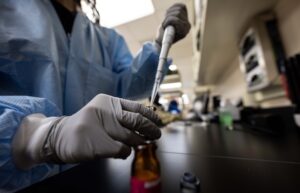
Story by Ken Cornwell
Defense Health Agency
Defense Health Agency military medical laboratory professionals play a crucial role in supporting warfighter readiness, said U.S. Navy Lt. Cmdr. Clara Pangco, laboratory department head at Naval Hospital Twentynine Palms in Twentynine Palms, California.
She is one of hundreds of military lab professionals who offer critical services and vital information to service members and families.
“Lab teams are part of patients’ health care teams and assist providers in making clinical decisions,” said Pangco.
“We provide relevant information to help treat and diagnose,” she said. “From a warfighting readiness standpoint—we ensure service members are ready to deploy and can meet the demands of combat operations.”
It’s fulfilling and rewarding work, noted Pangco.
“I love everything about laboratory science and its management, as we get to play scientists, investigators, and problem solvers every day,” she said, noting that their work is often behind the scenes.
“The laboratory result a patient or provider sees is but a small percentage of the work we do,” Pangco continued. “Day in and day out, we make sure the result is always accurate and reliable by ensuring we adhere to strict quality assurance requirements such as equipment maintenance, calibration, and quality control.”
Like the Twentynine Palms team, warfighter readiness is a priority for the lab team at Yokota Air Base in Tokyo, according to U.S. Air Force Lt. Col. Cordy Herring, Yokota Air Base lab officer.
“All service members have Individual Medical Readiness requirements, which include specific immunizations, physical examinations, and medical evaluations,” he said. “The lab collects, tests, and ships samples for IMR testing to ensure people are medically ready for deployment.
“We also run several programs contributing to readiness,” said Herring, “including a frozen blood program, an expeditionary blood program, a laboratory biological defense team, and a walking blood bank team.”
In addition, the Yokota Air Base lab team supports clinical operations.
“The team examines tissues and bodily fluids and provides information to clinical teams to help determine overall health and treatment plans for our patients,” explained Herring. “We also provide blood products for hemorrhaging patients to save lives.”
The team collects forensic samples for alcohol-related incidents, aircraft mishaps, and also sends samples to assist with Department of Defense investigation processes.
“We are always striving for continuous improvement,” Herring added.
These improvement efforts were showcased during a recent visit from the Air Force Blood Program and the Food and Drug Administration.
“The visit resulted in the lab being named as one of the best within Japan’s DOD military hospitals and clinics,” said Herring. “The FDA was very impressed. We received a flawless inspection, acknowledging our safe blood practices and our commitment to care.”
Preventing Disease and the Spread of Infection
Lab professionals also help conserve service member strength by working to prevent disease and infection, said William Gibson, supervisory microbiologist at Madigan Army Medical Center at Joint Base Lewis-McChord, Washington.
“Our lab tests over 100,000 specimens per year from beneficiaries on the West Coast, including Alaska, to the Midwest,” said Gibson. “The microbiology laboratory’s scope includes bacteriology, immunology, molecular microbiology, mycology, and blood parasitology.
“We are currently working on several projects including cervical cancer screening through HPV testing,” he continued.
“We started HPV primary screening on April 7, 2025—this is a national guideline supported practice that is both workflow optimization and fiscally efficient,” said Gibson. “This summer, we intend to offer HPV self-collection testing, which has the potential to increase access to care.”
Communicable disease reporting is another ongoing project.
“Infections are a fact of life. Everyone will be personally impacted by one throughout their lifespan,” he said. “Our active duty force travels the global and are exposed to a myriad of pathogens in which we must be able to provide education for prevention, prophylactics, diagnostics, and treatment for the world’s diseases.
“We are looking to make sure that the reporting systems used to trace certain infections contain all the applicable test results across the DHA enterprise,” said Gibson. “This helps ensure the DHA, especially Epidemiology and Infection Control staff, have accurate data to react to things like outbreaks and facilitate an operational picture regarding medical intelligence.”
Delivering for Beneficiaries
Herring said the lab is needed.
“Whether taking care of our patients, consoling a child when they are crying about getting blood collected, providing information to commanders to make decisions on careers, detecting possible biowarfare agents, or ensuring we can take care of our populace with blood programs—the lab is involved in operations,” he said.
This is all made possible through teamwork.
“The team works hard together,” said Herring. “They excel in all duties and leave programs better than they found it. We take care of each other, support each other through the stressful times, and celebrate our wins. We’re proud of how much we have grown, how much we have accomplished.”
Pangco had praise for the staff at Twentynine Palms.
“I am blessed with a great team,” Pangco said. “Our recent successful FDA and College of American Pathologists reinspection was a testament of their hard work and dedication. The inspectors expressed noteworthy commendations. It was an all-around team success.”
Ultimately, caring for beneficiaries is at the heart of the work of every lab professional.
Gibson said, “It’s an honor to serve our beneficiaries, and we strive to provide them with world-class health care service.”